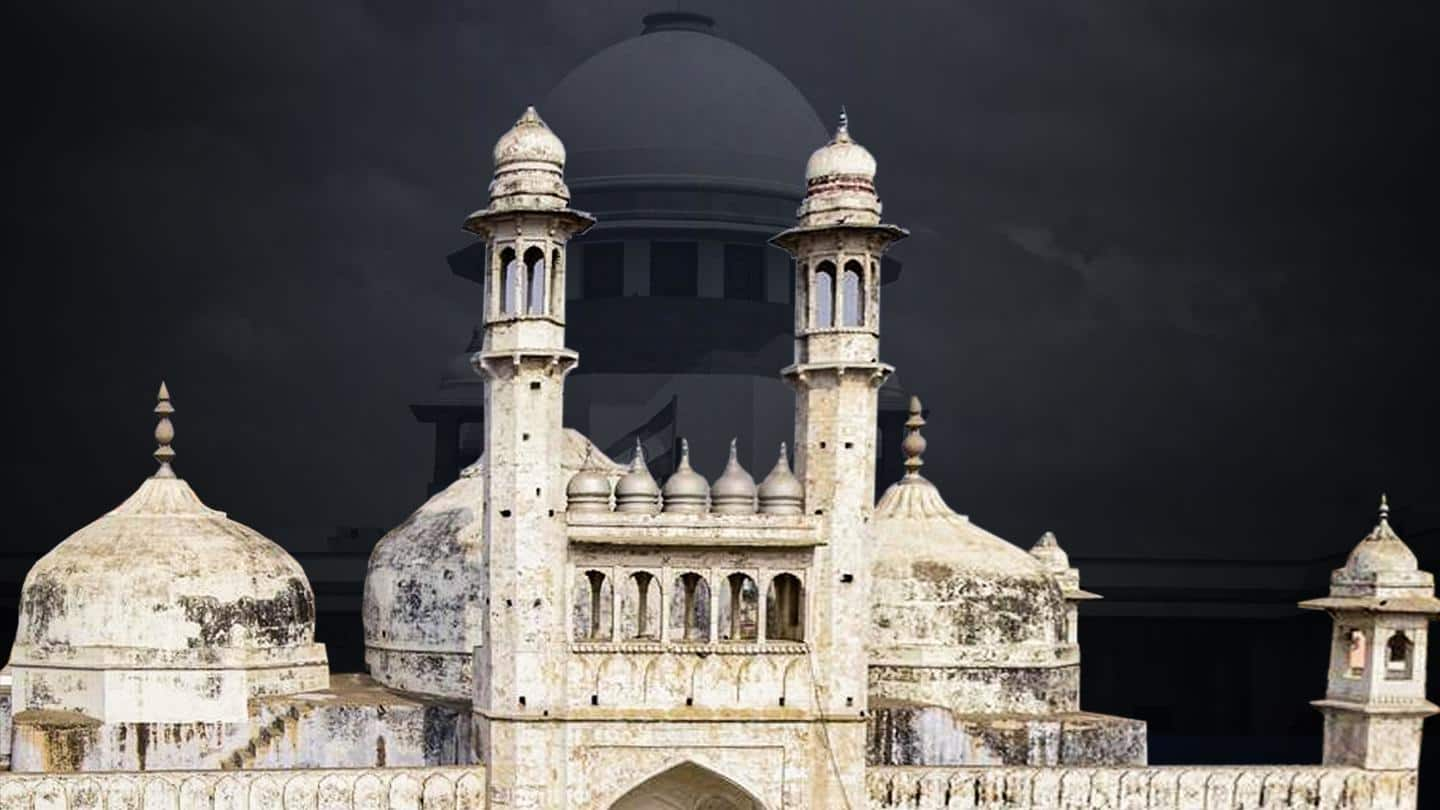
Gyanvapi case to be heard by 'experienced' district judge: SC
What's the story
The Supreme Court (SC) on Friday said that it would not interfere with the survey order passed by the Varanasi court in the Gyanvapi Mosque case, adding that an experienced district judge must now hear the case.
Taking a strong view of the survey report leak, the SC said that "selective leaks" to the press must stop.
The next hearing is scheduled for Monday.
Context
Why does this story matter?
After a Shivling was found inside the mosque complex on Monday, the Varanasi court ordered to seal the spot.
Disputing the claim, Anjuman Intezamia Masjid said the object was part of the wuzukhana's fountain.
The Supreme Court also ordered to protect the area, without hindering Muslims' access for namaz.
The survey team submitted the final report to the Varanasi court on Thursday.
Balancing act
SC's interim order to continue
The SC said that Tuesday's interim order for the protection of the Shivling and unhindered access to Muslims to offer namaz would continue, adding that the "need for fraternity between communities and need for peace is topmost."
"We need a sense of balance and calm...We need a degree of healing touch...joint mission for preserving a sense of balance in the country," Justice Chandrachud said.
Transfer of case
Not making aspersion on the trial judge, says SC
While transferring the case, the SC said since the civil suit is sensitive in nature, the district judge must hear the matter instead of the civil judge.
"A slightly more seasoned and mature hand should hear this case. We're not making aspersion on the trial judge. But a more seasoned hand should deal with this case and it'll benefit all parties," the SC said.
Pending suit
Allahabad HC adjourns hearing Gyanvapi Mosque case till July 6
The SC order stated that unless adequate arrangements for observance of wuzu were made by the district magistrate, "we direct the district magistrate, in consultation with the parties, to make appropriate arrangements for the observance."
Meanwhile, the Allahabad High Court on Friday adjourned the hearing of a petition challenging the suit pending in the Varanasi court in the Gyanvapi Mosque issue till July 6.
Mosque
District judge to handle trial of suit for worship
The apex court bench of Justices Chandrachud, Kant, and Narasimha also said that the district judge would handle the trial of suit for the worship of Hindu deities inside the mosque.
The mosque management committee's plea that the suit was not maintainable because of the bar under the Protection of Places of Worship Act, 1991, would be decided on priority.
Hindu-Muslim
What are both the sides saying?
The Hindu side said it was happy with the Supreme Court's decision to continue the interim order protecting the Shivling area.
However, senior advocate Huzefa Ahmadi, representing the Committee of Management Anjuman Intezamia Masajid (AIM), objected saying that "the status quo of 500 years had already changed by sealing the premises and added that the status quo, which existed before, must continue."
Ruling
What had the Muslim side pleaded in SC?
The Supreme Court had heard the Muslim side's plea on Tuesday and ordered the Varanasi district administration to protect the area where the Shivling was allegedly found without impeding Muslims from coming to offer namaz.
Ahmadi sought a stay from the SC on all the orders of the trial court, including the appointment of a commissioner, ANI had reported on Tuesday.
History
Court allowed survey on Delhi-based women's petition
To recall, in April 2021, five Delhi-based women had sought permission from a Varanasi court for year-long, daily worship of deities Shringar Gauri, Lord Ganesh, Lord Hanuman, and Nandi in the mosque complex.
Currently, devotees are allowed to worship Shringar Gauri only on the fourth day of Chaitra Navratri.
Later, in April 2022, the court ordered a survey and videography by the court commissioner.
Context
Controversy began in 1991 after petitions against mosque
Back in 1991, lawyer Vijay Shankar Rastogi had filed a petition in a Varanasi court as the "next friend" of the Kashi Vishwanath Mandir's presiding deity.
Rastogi had argued Maharaja Vikramaditya built a temple 2,050 years ago on the site where the mosque stands.
Other petitioners claimed Aurangzeb built the mosque in the 17th century by removing a portion of the Kashi Vishwanath Mandir.
Background
The case so far
The 1991 Gyanvapi case was on hold for several years until the Allahabad High Court suspended the hearing.
However, the case resurfaced in 2019 following the Supreme Court's decision in the Babri Masjid-Ram Janmabhoomi case.
The Allahabad HC's decision was based on the Places of Worship Act, 1991, forbidding any changes to a worship place's religious character as it was on August 15, 1947.